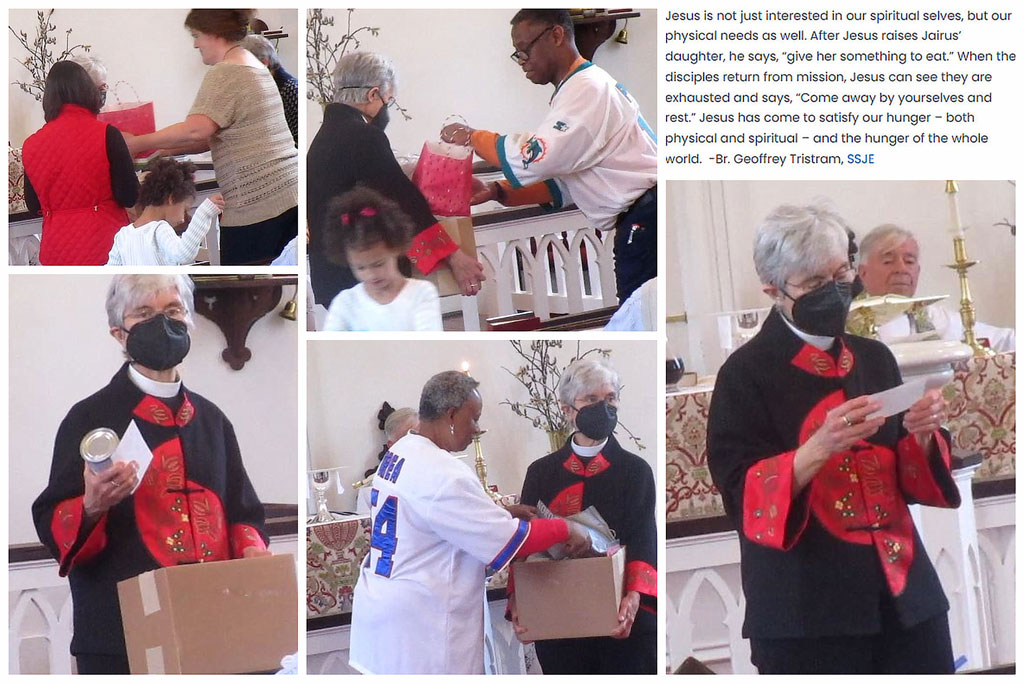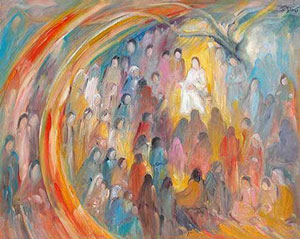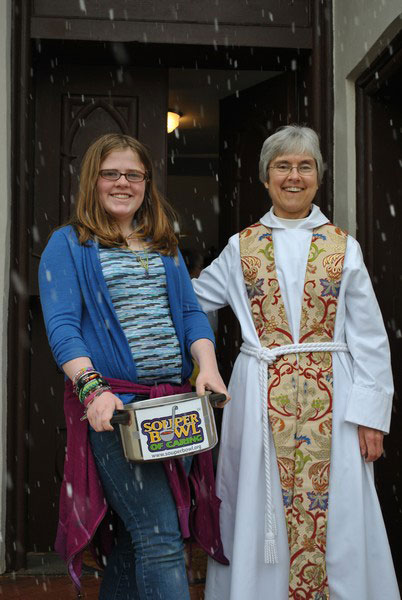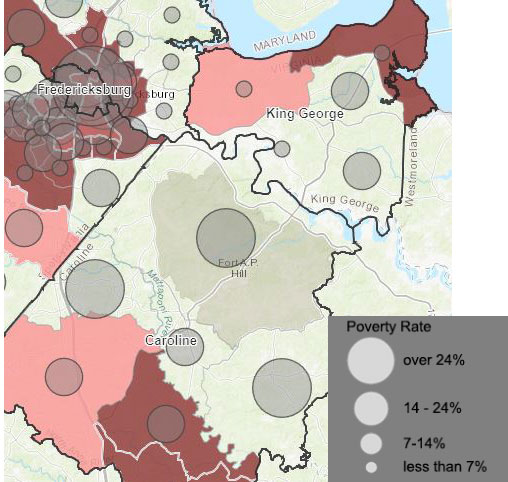I.Theme – The joy and blessings of obedience. Also, is the idea of building a new community through new behaviors (culminating in Matt 5: 37).

“Hands across the Divide” – Maurice Harron. A metal sculpture in Londonderry, Northern Ireland
Since the 17th century, Londonderry has had two cultural traditions: Catholic and Protestant, Irish and Ulster Scots. During the Troubles, this became a big problem. The city became best known for tragedies like Bloody Sunday, and so most tourists stayed away. Yet since the start of the peace process, Londonderry has been transformed. It’s rediscovered its rightful role as a cultural destination, and its dual heritage has become an asset, rather than a source of strife. The image is included in relationship to the Corinthians reading.
The lectionary readings are here or individually:
1A. Old Testament 1 Ecclesiasticus 15:15-20
1B. Old Testament 2 Deuteronomy 30:15-20
2. Psalm– Psalm 119:1-8 Page 763, BCP
3. Epistle – 1 1 Corinthians 3:1-9
4. Gospel – Matthew 5:21-37
The Old Testament and Gospel readings are linked around the older community in Deuteronomy (The setting is the plains of Moab, as the Israelites prepare to cross the Jordan into the Promised Land) and the new community in Matthew (Jesus at the Sermon on the Mount). How do we get along in community ? The focus is the calling and teaching of disciples of Jesus. (Paul in Corinthians is centered on a related idea – being or becoming healthy as the body of Christ.)
Deuteronomy
In the four verses immediately preceding 30:15–20, Moses assures the people that the commandments of the LORD are neither too hard nor too remote.
Just prior to our text, Moses announces wonderful blessings for an obedient Israel and blood-curdling curses for an apostate Israel (chapter 28). These benedictions and maledictions are followed by a prediction of eventual exile (29:18–29) and return (30:1–10) .
Having assured the people that what God commands they can do, Moses launches into his final call for a decision.
The choice is stark. “If you obey the commandments of the LORD your God that I am commanding you today…then you shall live and become numerous
But if your heart turns away and you do not hear… I declare to you today that you shall perish; you shall not live long in the land that you are crossing the Jordan to enter and possess.” Moses use of the word “today” is the hope for a new beginning.
Like Matthew there is the emphasis on the creation of a new community. There is the need for a break with the past. However, in the following chapter, it becomes very clear that both Moses and God know that the people will fail miserably.
Psalm
The first section of the ‘long Psalm’ is an acrostic based on alpeh, the first letter of the Hebrew alphabet. Like the other 21 sections of the Psalm, it consists of eight double lines. The longest acrostic Psalm, it is therefore constructed with great skill, which no translation can really convey. The choice of vocabulary is also rich, expressing different terms for what we very flatly call ‘law’. Although the Jewish celebration of ‘rejoicing in the law (simchat torah) was a later development in Judaism, the psalm expresses similar sentiments. As a Psalm extolling the torah, it has similarities to Psalms 1 and 19:7-11. These eight verses are a suitable general introduction to the rest of the Psalm.
1 Corinthians 3: 1-9
Following on from the situation reported to him by ‘Chloe’s people’ (1:11), after an excursus dealing with ‘the message of the cross (1:18-2:16), Paul returns to the theme of factions in the church at Corinth. However, the intervening section emphasizes the cross as God’s wisdom. This stands in sharp contrast to the rivalry exhibited by the groups in the church. The metaphor of ‘growth’ is developed both in the imagery of the ‘child’, and also of the ‘field’. Paul’s favorite dichotomy of flesh and spirit is also to the fore. Nevertheless, the Corinthian believers are still Paul’s ‘brothers and sisters’, and fellow workers. Despite their shortcomings, although he does reprimand them he does not disown them. The fact that only Paul and Apollos are mentioned here (and not Cephas nor Christ, as in 1:12) probably reflects the history of the congregation’s founding and leadership by these two apostles. Paul might have taken some of the glory for this, but he refuses to do so.
Matthew 5: 21-37
The first four of the six ‘antitheses’ of the Sermon on the Mount are included in this reading (the final two are in next week’s reading). The quotations from ‘those of ancient times’ include aspects of both torah and tradition (halakah). The time-honoured description of this section as ‘antitheses’ may be misleading, for although in part Jesus cuts across the interpretation of the law, he does not contradict or discard torah itself. Jesus’ own interpretation intensifies and internalises the force of the commands.
Jesus also broadens the impact of torah/halakah, ie murder becomes an issue of anger and unforgiveness; adultery is broadened to include lust and stumbling-blocks in general; divorce and adultery are linked; and the making of vows is illustrated by specific examples and by the simplicity of Jesus’ teaching.
The explanatory expansion of these commands by Jesus may also be understood as the root cause of the specific sin, eg anger or unforgiveness in the heart can lead to physical murder.
II. Summary
Old Testament – Ecclesiasticus 15:15-20
Two verses in the Old Testament seem to imply that God causes a person to sin at times:
God “hardened Pharaoh’s heart” in Exodus 11:10 and
in 2 Samuel 24:1 God “incited David” to count how many subjects he has – out of pride.
But Sirach disagrees: in no way can God be held responsible for human sinfulness (vv. 11-12). God not only hates sin but he even preserves the godly person from committing it (v. 13).
In v. 14, he says that God “left them in the power of their own free choice”. (A scholar says that inclination is a better translation.) One can incline:
towards godliness (“life”, v. 17) by obeying the Law (v. 15) or
towards ungodliness (“death”, v. 17) by refusing to obey.
God does allow us to go our own way, but he is always there to help us follow his ways. Only with his love can we attain eternal life. “Fire and water” (v. 16) are opposite extremes, and don’t mix. There are two choices; they are mutually exclusive. Then vv. 18-20: even though God is omniscient (he knows all that we think and do), he does not cause people to sin.
Old Testament – Deuteronomy 30:15-20
The setting is the plains of Moab, as the Israelites prepare to cross the Jordan into the Promised Land. The book states that Moses is the speaker, but the laws given in Chapters 12-28 are updated versions of those in earlier books.
Times have changed since Sinai: the people were semi-nomads then; now they are farmers and shepherds. It is a time of religious revival, of new commitment to God. V. 6 puts the Law in a new light: God will “circumcise your heart” – he will work changes within the people so love becomes the driving force. Note also v. 20: “loving the Lord your God …”. They will keep the Law because they love God.
Our reading summarizes Chapters 27-28, which tell of:
-the ways in which the Israelites will be blessed if they keep this expanded and updated covenant; and
-the consequences of failing to keep many of the laws, i.e. being excluded from the community.
Then it offers a choice: keep the laws in love and obedience, or suffer the consequences of following other paths. Keeping the Law because you love God will have many benefits, including long life (“length of days”, v. 20).
Psalm -Psalm 119:1-8 Page 763, BCP
This is the first stanza (of 22, one for each successive letter of the Hebrew alphabet) of the longest psalm. Each of the verses of this stanza begins with aleph, the first letter. The whole psalm is in praise of the Law (the expression of God’s covenant with humankind in the Old Testament) and of keeping it. The emphasis is on the love and desire for the word of God in Israel’s law, rather than being burdened with it. The psalm begins with a prayer for help in observing the Law. To be “happy” (vv. 1-2) is to be blessed by God. As in other stanzas, various words are used for “law”; here they are “precepts”, “statutes” “commandments”, and “ordinances”. The psalmist seeks to avoid sin, and to live in God’s ways.
Epistle -1 Corinthians 3:1-9
In Chapter 1, Paul says that he has learnt that there are divisions in the church at Corinth, that some adhere to particular leaders of the community rather than to Christ. The faith only makes sense to those who understand it spiritually, so he addresses them not as “spiritual people” (v. 1) but as neophytes (“infants”). He has been criticized for oversimplifying the good news, but their “jealousy and quarrelling” (v. 3) demonstrate that they are still only earthly minded, are still behaving according to human standards (“inclinations”).
It is natural to be attached to the person who welcomed you into the church, but you need to recognize that they are all “servants” (v. 5) of Christ. Each has a distinct function in bringing you to faith. Paul founded the church at Corinth (“planted”, v. 6); Apollos nurtured faith (“watered”) in the community; but it is God who causes spirituality and faith to grow. He and Apollos have the same objective (v. 8). Perhaps the rewards (“wages”) are in seeing the church grow; perhaps they are in heaven. Paul and Apollos are co-workers. In the following verses, Paul expands on the church as “God’s building” (v. 9).
Gospel – Matthew 5:21-37
Epiphany is the inbreaking presence in Jesus Christ in the world. We see this in this week’s Matthew’s Gospel
The section is a continuation of the Sermon on the Mount. Having announced the good news and the kingdom of heaven having broken in (4:23-24), Jesus proclaims the guiding precepts of that kingdom in the Beatitudes (5:1-12), and announces that his followers are to be “salt” and “light” in the world and proclaimed the fulfillment of prophesy and the law. The law remains in full force “until all has come to be,” a reference to the death and resurrection of Jesus which brings the New Creation.
Matthew builds his Gospel around five main discourses. He probably did this with the five books of the Torah (or the Law) in mind. His intention was almost certainly to portray Jesus as the new Moses, giving a new Law for the New Covenant. Which, of course, makes it very tempting to believe that we have an excuse for doing away with the law altogether. But, this is not what Matthew – or Jesus for that matter – was doing. Rather, in the Sermon on the Mount, to which we continue to listen this week, Jesus makes it clear that he has come not to abolish the law, but to fulfill it – literally to perfect or complete it (Matthew 5:17-19).
And in the section which is set for Epiphany 6 (Matthew 5:21-37), this fulfillment is demonstrated in remarkable ways. Jesus, it seems, knew that the law could be cold-hearted. He knew that it could be used to demean and oppress. He knew that a law that was left in the realm of letters and court rooms could often accomplish the exact opposite of what it was originally intended for.
The law must become part of our hearts. Jesus in these teachings is standing on the foundation of prior teachings from Hebrew Scriptures about the heart as the inner source of outer actions, subject to the good or evil influence of imagination. He’s asking, “What is in your heart?
Jesus gives the disciples a new way of life, not rejecting the tradition, but building upon it, explaining what they really meant . It is a way of life that demands more and promises more. He identifies the divine ideal behind the law. God requires righteousness (right living) and it has to be better than what he alleges many Jewish leaders of his time achieved (5:20). It is a necessary surpassing righteousness required of a person to enter the kingdom of heaven. . People can hear the commandments and not understand what they are really about
In that it is all about relationships. And so Jesus speaks the radical message of the complete law, calling us not just to ensure that we uphold the letter of the legal code, but that we uphold the dignity and humanity of our companions in this world. The New Community is not a “new and improved” old community. Rather, it is a reconciled and beloved community in which all people are treated with dignity, not with contempt , and with affirmation, not deprecation .
Jesus shifts our attention from particular behaviors we must avoid to particular interior orientations we must cultivate. Kingdom righteousness saturates our whole lives, and promises much more, too. It is the way of blessedness.
No longer do the teachings on murder and adultery apply strictly to acts of murder and adultery. Instead, they become doorways into the examination of many internal dynamics as well as external behaviors of one’s life: anger, derision, slander, false generosity, litigiousness, arrogance, lust, temptation, alienation, divorce, and religious speech. Jesus advises that one discard, promptly and decisively, anything in one’s life that tempts one to turn away from God.
Then follow six instances in which Jesus announces new interpretations of the law–indeed, some would say, changes the law. He will teach in regard to anger, sexuality, divorce, oaths, retaliation, and hatred of enemies.
In this text Jesus provides his teaching on three of the Ten Commandments (plus divorce):
1. You shall not commit murder.
2. You shall not commit adultery and divorce
3. You shall not bear false witness.
The way Jesus refers to them indirectly was a way to direct importance to them
1. Murder
Jesus extends this law to include propensities to kill: nursing anger, calling someone good for nothing (as the Greek says) or a “fool” (v. 22)
Jesus is saying: if you take the command, “Do not kill”, seriously, then you will not embrace hate and let you anger turn to abuse of others. You will write no one off. The fifth contrast will speak of retaliation – also a form of hate. The sixth contrast matches the first because it has the same theme: love your enemies. In Jesus’ teaching the foundation is God’s love and openness to all.
There is a certain attraction in being able to divide people into those we love and those we hate – and those we don’t know so don’t care about anyway. It seeds racism. It rescues us from complexity and the messiness of needing to think, and to engage the unfamiliar and less amenable to us and our ways. The religious form of this is to deem some people as never having been chosen, never having been of worth, not counting. Religions use it to rationalise rejection. It is, alas, alive and well. It is easier to eliminate people in this way than to take up the challenge of respecting them, engaging them, seeking a right relationship with them – God’s way according to the gospel, though “God” is often made to model, motivate and rationalize our fondness for hate.
There are two more teachings about anger; the first having almost a touch of humor to it: Someone has something against you? Then go back home (to Galilee?!) and sort it out – even if it means a few days’ journey (5:23-24)! Similarly, Matthew has what sounds like advice at conflicts which might end up in court and land you in jail (5:25-26). It is really a powerful way of urging people to deal with conflict directly and immediately. Later Matthew’s Jesus instructs people to put effort into sorting out problems of wrongdoing in the community (18:15-18) and approaching them with compassion and prayer (18:12-14, 19-20, 21-35).
We still need that wisdom: don’t go gossiping! Don’t just sit on it (it might explode destructively one day or you might implode with stress). Deal with it. When Jesus said, “Blessed are the peacemakers” (5:9), it is clear from Matthew’s gospel, that he did not mean, blessed are those who sweep things under the carpet, or those who lie to themselves and others about pain. If it hurts, say so. Deal with it!
Verse 22, “with a brother or sister.” These teachings of Jesus are addressed specifically to his followers who are to treat one another as they would their blood relatives. In fact, Jesus lays down higher standards. But the key to remember is that at the time of Jesus ones family was everything, and the provision of this alternate family – the community of followers of Jesus – was a radical disruption of a paramount social foundation.
2. Adultery
God expects purity of thought and desire as well as of action.
The punishment for adultery was for both the adulterer and the wife to be put to death, “so you shall purge the evil from Israel.”
But Jesus proposes another way to purge the evil of adultery – tearing out the eye that looks with lust on another man’s wife! The added nuance is the “right” eye. “To pluck out the right eye” means to suffer dishonor. Thus the followers of Jesus are urged to practice self-discipline, both in not committing the kind of seeing that leads to dishonoring of others, and in voluntarily dishonoring oneself in the service of restoring the peace of the community.
The issue is not having sexual feelings, but what one does with them. As with anger, if you have them and harbor them towards a married woman, then you are in effect an adulterer in your mind. Get your mind sorted out. Seeing” for the purpose of “desire” is not seeing a woman as a person but as an object. Again, the kingdom of heaven is about the dignity and affirmation of others, not using them for one’s own purposes.
3. Divorce
With regard to the third contrast, there was no command about divorce, but it is implied in the instructions of Deut 24:1-4, which prohibited remarrying someone you had divorced. Divorce became a problem especially when Judaism began to move away from polygamy.
Divorcing a wife was easy for a man in Palestine: in some circles, he could simply write her a “certificate of divorce” (v. 31) without cause. Jesus’ point here is that marriage is indissoluble, lifelong. Sexual intercourse made people permanently one. He probably thinks of Genesis 2:24: in marriage, God makes man and wife “one flesh”. He makes one exception: “on the ground of unchastity” (v. 32). The Greek word means unlawful sexual behaviour, including adultery. He forbids remarriage because the first marriage still exists. The view that adultery was intolerable was widely held across Greek, Roman, and Jewish culture, requiring the death of both people at some points in history or, if not, certainly divorce.
Because Jesus consistently shifted the focus from just act to attitude of mind we are able to embrace what also the wisdom about human relations has taught us, namely that usually adultery is usually a symptom of something else as well, so that things may have gone badly wrong, even irretrievably so, long before an act of adultery has taken place, indeed even when it has not taken place. Reconciliation and healing mean dealing with these complexities of the mind and attitude towards which the gospel also points us. Our gospel commitment to marriage and relationship remains, but works itself out in ways that may sometimes see (agreed) divorce as the most creative way forward and may also have us recognizing that marriages where adultery has taken place can be retrieved, revived, even to become stronger and more fruitful for having worked through the underlying issues.
4. Oaths
Matthew 5:33-37: You shall not bear false witness.
This extension of the Law was not onerous for first-century Christians, for they expected the world to end soon, and they could live separately from their spouses. Then vv. 33-37: one swore an oath to guarantee that what one said on a particular occasion was the truth.
The Torah allowed for oaths, even prescribed them in some cases, but Jesus said not to swear “at all.” Sometimes today we may need references, witnesses, guarantors, as an aid to those who might otherwise be unsure or where some communally agreed norms are at stake, such as oaths of office or in court,
Jesus says one should always tell only the truth. When one does, there is no need for swearing[-in]. A truthful person is consistent in what he says. Inconsistency is a sign that one has turned against God (v. 37).
People can get quite inventive with oaths, which is why Jesus goes on at some length condemning them/ The problem with oaths is that they can be an effort to cover false promises or to further one’s own ends by invoking God’s name, God’s honor.
Oath-swearing is for people who don’t trust each other, as if underlining our cheap words with a patina of piety might make them more believable. Oaths actually serve to underline doubt, not certainty. In the New Community, there is no need for such oaths because reconciled people speak the truth to each other and live in trust with each other.
III. Articles for this week in WorkingPreacher:
Old Testament – Deuteronomy 30:15-20
Psalm – Psalm 119:1-8 Page 763, BCP
Epistle – 1 Corinthians 3:1-9
Matthew – Matthew 5:21-37








